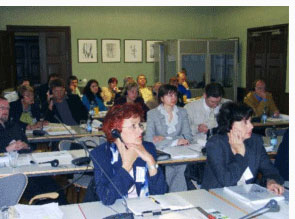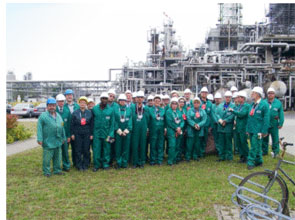|
|
 |
|
|
|
Summary of the training
|
|
A seminar on the topic „Application of the checklist method to examine and assess the technical safety of plants relevant to water pollution control “took place from the 19th of September to 22nd of September 2005 at the German-Polish environmental education and meeting centre "Brandenburg academy castle Criewen". This event is part of the project „Activities for Accident Prevention - Pilot Project - Refineries" financed by the UNDP/GEF.
|
|
The Seminar meeting
|
|
The participants numbering about 20 men and women from the environmental protection agencies of the Danube member states were welcomed by Mr. Varduca, chairman of APC Group (Accident Pollution Control Expert Group) and Mr. Liska from the ICPDR. They stressed the importance of the meeting and declared the seminar opened. The welcome address on the part of PCK Refinery was delivered by Mr. Langner, head of the environmental protection section.
Thereafter, Gerd Winkelmann-Oei from the Federal Environmental Agency (FEA) took over the technical moderation of the seminar.
In his introductory lecture Mr. Winkelmann-Oei spoke on incidents having substantial impact on the quality of water, e.g. the incident in Baia Mare as well as the fire incident in Sandoz and presented technical measures for preventing such accidents. The lecture showed the participants clearly which consequence the neglect of such preventive measures can have.
|

Fig. 1: Participants at the seminar
|
|
In the subsequent paper, Kerstin Tschiedel from the environmental Agency of the state of Brandenburg delivered a lecture on the technical and basic idea of safety policy. She described clearly the cross-linkage between production/entrepreneur and human/environment based on the thesis of safety. Furthermore, she dealt in details with different levels of safety like minimum, extended and special requirements in regard to different sections of industrial plants being inspected.
Afterwards, Jörg Platkowski, from R+D Industrie Consult in Uslar delivered a lecture on the idea of the checklists method and its application. Regarding the definition of the necessary measures and the rehabilitation priorities exemplarily technical proposals were presented.
In subsequent lectures, Mrs. Tschiedel, Mr. Platkowski and Mr. Konrad Kulpock, from R+D Industrie Consult in Uslar described the approach to plant check and assessment using the checklist method. Both the checklists and also technical background knowledge about them were presented, e.g. on topics like splitting of factory into smaller units and determination of the danger potential, technical requirements on transshipment sites, safety of in-plant pipelines, general safety precautions for storage facilities as well as equipments of tanks.
The second day of the seminar stood under the slogan: Checklists for other relevant functional units and organizational concepts for the whole factory as well as the PCK refinery and their safety concept.
Topics such as sealing systems, split-flows wastewater, protection against flooding, collection of fire fighting water, internal alarm and hazard control planning as well as plant monitoring were discussed.
The central point of the discussion in the afternoon was the presentation of the PCK refinery. In several lectures Mr. Langner and Mr. Matthey described the development of the PCK to an environmentally conscious and efficient enterprise. They spoke on topic like
emissions, safety engineering and the problem wastewater and water hazardous substances.
|
|
Factory site visit
|
|
The theoretical knowledge acquired during the last two days of the seminar was to be applied practically on the third day. A plant which is common in every refinery was selected in coordination with the PCK refinery GmbH for this purpose. This is therefore important because a refinery in Romania will be the focus of visit next year and a conclusion on the different level of the safety engineering in the refineries is supposed to be derived from the visits.
For this purpose the atmospheric crude oil distillation 3 was chosen.
|

Fig. 2: Industrial plant visit at PCK
|
|
In two thematic groups, the checklists were applied on different subject area:
The first group examined the storage as well as desalting of the crude oil and the second group, the actual atmospheric distillation.
The first step after the site visit was to split the plant into smaller components and then determine which of the many checklists for which of these smaller units should be applied. The question about which of the checklists is appropriate was then discussed thereafter. This discussion was utilized by the inspectors to table and clear all theoretical and practical details.
The last day ended with intensive discussions of the topics in groups as well as presentation and discussion of the result in a large group.
The last item on the agenda was the presentation of a first draft of recommendation for refineries. This draft, derived from the BAT for refineries considered all refinery specific safety aspects regarding water protection.
|
|
Results
|
|
Mr. Winkelmann-Oei in his closing remark noted that the checklists should be seen as a „living document“. As a result of their practical utilization, the checklists can and should be revised and improved upon.
The participants of the training meeting affirmed that this method is very much suitable for checking and assessing industrial plant. They were however also surprised how complex the examination could be when applying the checklists method. However, the participants still do not have the assessment regarding the quantification of the actual risk, which will however be a component and an important result of the project.
Furthermore, there was the wish that the industrial plant site visit and the practical training with the checklists should be expanded. Training on the application of the checklists using theoretical examples will be expanded in the next seminar. Trying to expand the industrial plant site visit will be asking too much from the plant operators. We would like to use this opportunity to once again thank the PCK refinery LTD. and their officials Mr. Matthey and Mr. Langner for their support in making this seminar a success and to thank them most especially for
organizing the industrial plant site visit on the third day of the seminar.
The seminar was rounded up with the ceremonial issuing of the certificate of participation to all participants.
Further training seminar of this nature will be taking place in Romania next year, where inspectors will have the opportunity to report on their experiences with the application of the checklists method.
|
|
|

